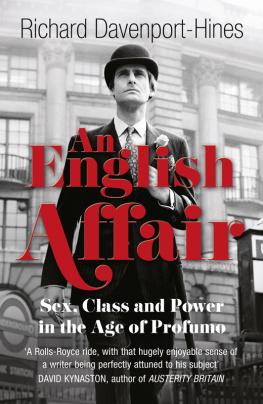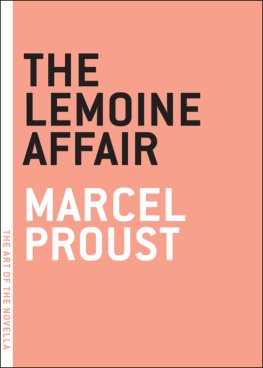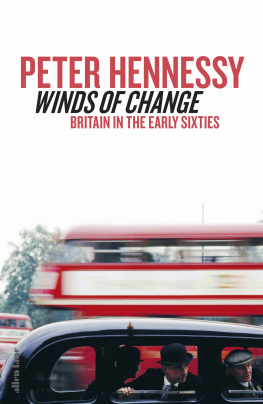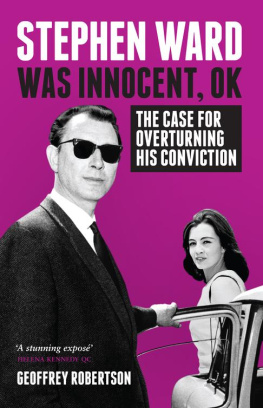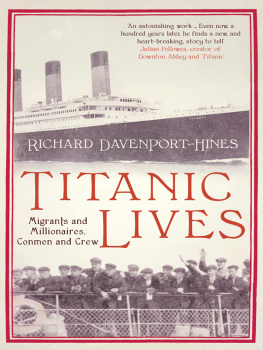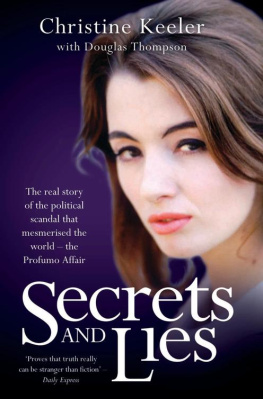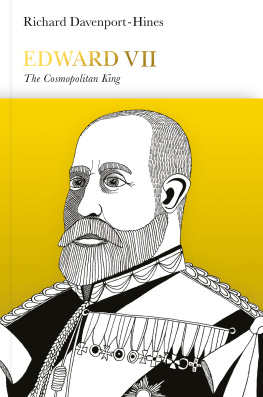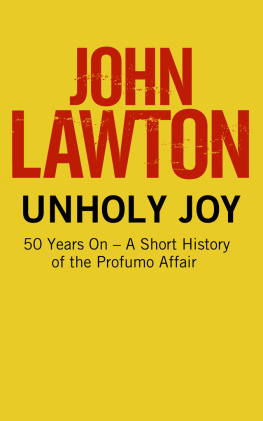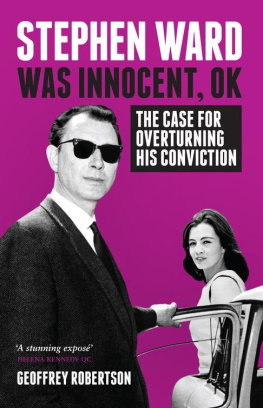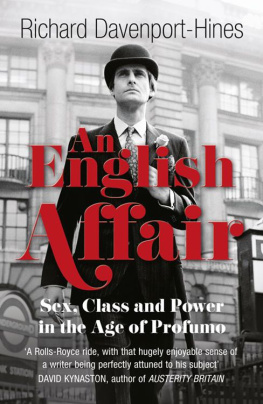CONTENTS
RICHARD DAVENPORT-HINES
An English Affair
Sex, Class and Power in the
Age of Profumo

I have news today that will bring a gasp from every Tory in Britain, reported Crossbencher, the political columnist of the Sunday Express, on 2 December 1956.
Mr Harold Macmillan is planning to retire from the Commons.
What a turnabout this is. Only the other day all the talk was of his rivalry with Mr Richard Austen Butler. He was alight with ambition, his Edwardian moustache bristling for the fray. It is true, of course, that he has lately been dropping a few little hints. In the Commons he talks of looking forward to retirement from many of these troubles. To the Tory 1922 Committee he says he is thinking of the viscounty that is my right. But these are laughed off by most people as typical Macmillan flourishes.
I report that Macmillan means exactly what he says. He intends to go. The reason? Not because of any personal clashes with his colleagues. Not because of any disagreement on policy. But he is sixty-three in February, three years older than [the Prime Minister] Sir Anthony Eden, nine years older than Mr Butler. And suddenly, with absolute clarity, he sees that the nations highest office is forever beyond his grasp. How sad a moment for a politician who has come so far. The moment when he realises that he is finally out of the race.
The only remaining question: When will Mr Macmillan claim his coronet?
One can imagine the poignant sorrow, the air of noble resolve, affected by Macmillan as he confided in the Sunday Express man. A few days later, Brendan Bracken, chairman of the Financial Times, reported a similar tale to the Express proprietor Lord Beaverbrook, but with a hard-headed gloss. Macmillan is telling journalists that he intends to retire from politics and go into the morgue. He declares that he will never serve under Butler. His real intentions are to push his boss out of Number Ten. A month later, on 10 January 1957, after seductive courting of the parliamentary party, Macmillan became Prime Minister.
Only a consummate politician would brief that he is on the brink of retirement as a device to reach the highest office. Macmillan had foreseen, since November, when he had a privileged talk with Edens physician, Sir Horace Evans, that failing health would force the Prime Ministers retirement. He knew, too, that many Tories felt, in the backbencher Robert Boothbys words, contemptuous disdain for Rab Butler as a boneless appeaser, and would not have him as Edens successor at any cost. His ruthless clarity and oblique tactics were outstanding.
Lloyd George was the predecessor whom Macmillan most admired, the arch-spiv among Prime Ministers shameless, improvising, compassionate, devious, inspired. Macmillan was a politician who mastered both appearances and realities, and understood the differences between the two. He was simultan-eously a romantic escapist and sturdy materialist. He studied mens wiles, and knew their weaknesses. He was a world-weary cynic about human vanity yet could be as shocked as a boy scout by the grubbiness of peoples motives. Outward calm masked high-strung agitation. He looked like a grandee, had the manners of an Edwardian man-about-town and was one of the last men in England who still put his tongue in his cheek when making a sardonic quip. His self-protective staginess, his toying with appearances, his patrician pose of authoritative nonchalance all so artfully embedded in the past were a source of strength and renewal when he was Prime Minister approaching the general election of 1959, but would prove a source of increasing weakness in the years before his resignation in 1963.
Macmillan had been born in 1894 in a tall, thin house in Cadogan Place, where Knightsbridge borders Belgravia. In his parents home solid comforts were joined with a dread of worldly show and admiration for spartan discipline. Maurice Macmillan, his father, was a partner in the publishing house of Macmillan, an outstanding example of Victorian self-help and constructive idealism, for it had been started by Maurices father and uncle, themselves the sons of a crofter, a poor tenant farmer, on the Scottish Isle of Arran. Macmillans mother was a physicians daughter from Indiana, which made him the only Prime Minister (apart from Churchill) to have an American mother. She proved morbidly possessive, withdrawing him from Eton when he was fifteen and sacking his tutor when he was sixteen. His education was further disrupted, for he was an early volunteer in the First World War, which began when he had been only twenty months an undergraduate at Oxford.
Macmillans war experiences, which proved his courage but shredded his nerves, are of supreme importance in understanding him. Overall he was wounded five times, and bore his scars and disabilities for seventy years. At first, on the Western Front, he was a bomb officer with the Grenadier Guards, training men to throw grenades, and pacifying himself with the novels of Dickens and Scott. In the first battle in which he fought, Loos in 1915, he was shot in the hand and also suffered a head injury. In 1916 he was wounded during a reconnaissance mission to German lines. The stench from the dead bodies that lie in heaps around is awful, he wrote to his mother after the Battle of the Somme. We do all the burying that we possibly can. Once, leading an advance platoon down a moonlit lane near the devastated village of Beaumont-Hamel, he passed a dead German with an outstretched arm rigid in death: his orderly went up and shook it. A few days later, near Delville Wood, he was hit in the knee by shrapnel and in the pelvis by machine-gun bullets. A water bottle in his tunic deflected a bullet from hitting his heart. He rolled into a shell hole in no-mans land, where he lay for twelve hours, feigning death when Germans approached, dosing himself with morphine, and scanning a copy of Aeschylus which he had secreted in his battledress, until a rescue party found him. He nearly died of his wounds, endured several operations and years of gruelling pain. The act of death in battle is noble, he had written to his mother a few days earlier, but the physical symptoms and actual appearances of death are, in these terrible circumstances, revolting. He learnt, as no one should have to learn, to tell how a man had died by the way their body lay. The war left him with sporadic pain, a shuffling gait, a limp handshake and spidery handwriting. It accentuated the apprehensions that had made him such a sad, morbid, unpopular boy at Eton: the inside feeling that something awful and unknown was about to happen which still decoyed him as Prime Minister, and forced him to retreat from the world to spend weekends in bed.
While recuperating from his wounds, Macmillan immersed himself in books to enrich an already well-stocked mind. He had been elected a Kings Scholar at Eton in 1906, and was the first K.S. to become Prime Minister since Walpole. He ranked with Asquith as the best-read twentieth-century Prime Minister. He had the longest uninterrupted hold on power of any premier between Asquith and Thatcher. His literary-mindedness intensified when he left the army to become a partner in the family publishing firm. He became responsible for such authors as Kipling, Hardy, Yeats, Hugh Walpole, and Sean OCasey. Maynard Keynes, who had been the boyhood friend and perhaps lover of Harolds elder brother Daniel, was a Macmillan author with strong influence on his economic ideas. There had not been so literary a Prime Minister since Disraeli, and his love of novels made him the most vivid and alluring of political leaders. He calmed his nerves by happily re-reading Austen, Trollope and Meredith; excited his imagination with Stendhal or Nevil Shutes dystopic tale of radiation sickness after nuclear war; honed himself by reading Anthony Powell (witty but pointless) as a preliminary training for Proust. His temperament nervous, subtle and theatrical was decisive to the colour, texture and shape of the modernisation crisis in British politics and society of 195764.
Next page
